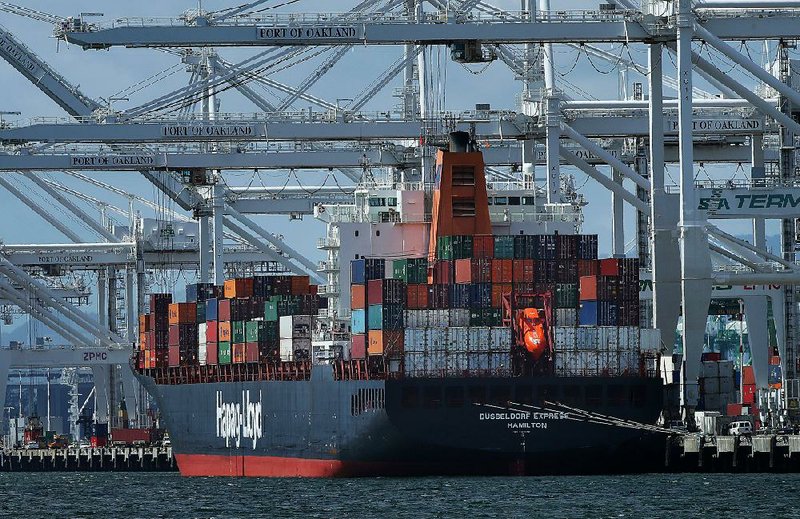WASHINGTON -- The global economy is looking stronger than it has in years, but as world leaders gather in Washington this week for the spring meetings of the International Monetary Fund, they will be particularly attuned to possible economic disruptions ahead.
In a report released Tuesday, the International Monetary Fund said stronger business investment and trade were buoying the world's economy. Global growth is on track to reach an annual rate of 3.9 percent this year and next, propelled by the economies of Europe, Japan, China and the United States. That would be up from 3.8 percent in 2017, which was the strongest growth since 2011.
But the spring version of the World Economic Outlook, the fund's semiannual report card on the health of the international economy, outlined big risks -- including the growing likelihood of a trade war and government policies that could overheat the U.S. economy.
Although the report did not mention President Donald Trump by name, some of the risks -- including a trade war -- are linked to his policies. Trump maintains that trading partners have not treated the United States fairly and that his administration must take tough action to level the playing field, including imposing tariffs on steel imports and products from China.
The fund also said the drivers of the global economy face challenges beyond trade, including the end of years of easy central-bank money and U.S. fiscal stimulus, a continuing slowdown in the Chinese economy and a world debt pile that has climbed to a record $164 trillion. Financial markets have been choppy this year, with U.S. stocks down slightly after a strong performance in 2017.
"Global growth is projected to soften beyond the next couple of years," the IMF said in its latest World Economic Outlook report. "Once their output gaps close, most advanced economies are poised to return to potential growth rates well below pre-crisis averages, held back by aging populations and lackluster productivity."
The IMF raised its forecast for the euro area, predicting the currency zone will grow 2.4 percent in 2018, up 0.2 percentage points from January. The fund left its forecast for euro-zone growth next year unchanged, at 2 percent.
China will grow 6.6 percent this year and 6.4 percent in 2019, the fund said. Both forecasts were unchanged from three months ago and were made the same day that data showed the economy grew 6.8 percent in the first quarter.
In a news conference detailing the report Monday, Maurice Obstfeld, director of the research department, said there was a particular risk that fears of a trade war could dampen business investment and spark a sell-off in stock markets and other financial assets.
"I suspect if you keep poking at the economic expansion, it could turn around and bite you," Obstfeld said.
"There can be no doubt about it, the big elephant in the room continues to be trade policy," said Torsten Slok, chief international economist at Deutsche Bank.
Companies are already paying higher prices for materials such as steel and soybeans and are beginning to feel uncertain about how to plan for the future, Slok said.
"This is hanging as a big dark cloud over the spring meetings this year," he said.
Trump's "America First" approach to economic policy has sometimes taken him into conflict with international organizations, which he has criticized as ineffectual. The IMF cautioned Tuesday that the multilateral, rules-based trading system of the World Trade Organization was "in danger of being torn apart."
Another risk is Trump's tax cut which, along with other budget changes, is expected to boost the U.S. economy by 1.2 percent by 2020, according to the IMF. There is concern the tax cuts could cause the economy to overheat, spurring inflation, which in turn could prompt the Federal Reserve and other central banks to raise interest rates. That could derail future growth and cause financial problems in fast-growing, but risky, emerging markets.
In the short run, the IMF expects the tax cuts to help lift economic activity. It forecasts the U.S. economy to grow by 2.9 percent in 2018 and 2.7 percent in 2019 -- up from 2.3 percent in 2017 and faster than the fund's previous projections.
Speaking at a rally Monday in Hialeah, Fla., Trump cheered the effects of the tax cut and the strength of the economy.
"This could be one of the greatest booms ever," the president said. "Congratulations, enjoy your money."
Outside the United States, global growth is roaring along, lifted by surging exports to China and strong consumption in India. Prices of commodities are going up after two years of declines, and that is good news for countries, like Brazil and Russia, that are big exporters of oil, gas, metal and agricultural products.
As it did in earlier reports, the IMF emphasized that the prolonged period of economic growth would eventually end and that policymakers needed to act now to prepare for the next downturn. The fund urged governments to make tough adjustments to increase their economic productivity now, while growth remained strong.
"The present good times will not last for long, but sound policies can extend the current upswing," Obstfeld said.
Information for this article was contributed by Andrew Mayeda, Zoe Schneeweiss, Sid Verma and Catarina Saraiva of Bloomberg News.
Business on 04/18/2018
